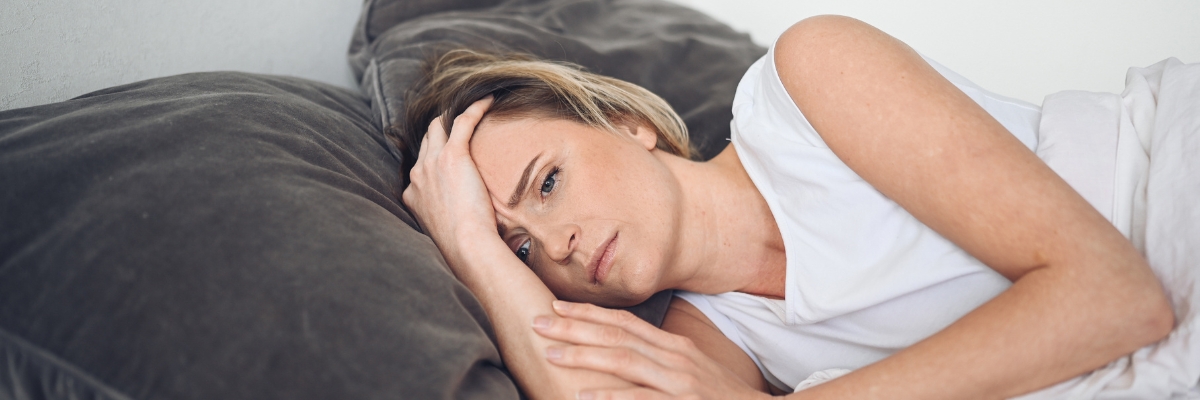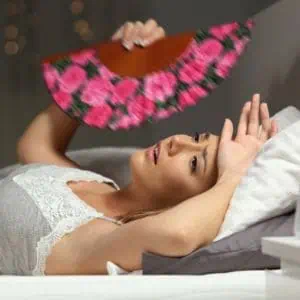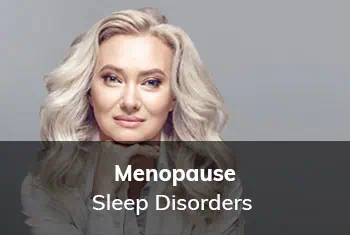Menopausal Sleep Disorders, causes and treatment options
Many female patients in their late 30s and 40s with symptoms of insomnia are experiencing the beginning of their menopause transition, which is called perimenopause.
Menopause can bring significant challenges to sleep. Menopause is notorious for interfering with sleep due to bothersome hot flashes and night sweats. Insomnia and sleep disruptions from hot flashes are common in women going through menopause. At least three out of every four menopausal women will experience hot flashes, and about 60% of women will report menopausal sleep disorders due to hot flashes, causing some serious sleep problems. Many menopausal or perimenopausal women have sleep difficulties, and the same goes for postmenopausal women, who have gone without a menstrual cycle for more than one year or who are in menopause after surgical removal of their reproductive organs.

Poor sleep quality and sleep disturbance are lesser-known menopausal symptoms during this phase of life, but they’re very common.
You might think that a good night’s sleep is nothing but a dream once you reach a certain age. Many women experience sleep problems during perimenopause, the time before menopause when hormone levels and menstrual periods become irregular. Often, poor sleep sticks around throughout the menopausal transition and after menopause.
What’s “good” sleep? Women should aim for between seven and eight hours of quality, uninterrupted sleep per night. The rule isn’t hard and fast, though; some people need less sleep, and others require more. In general, if you wake up regularly during the night and feel that your sleep isn’t restful, those are signs that you may not get good sleep.
Both sweat and tiredness resulting from insomnia can greatly affect their subjective quality of life.
How Menopause Affects Sleep
Menopause is driven by the decline in hormone production, most significantly the hormones estrogen, progesterone, and testosterone. These hormones work together to regulate a woman’s reproductive function and menstrual cycle. They also affect mood, energy, sex drive, cognitive and emotional abilities, and sleep throughout a woman’s life.
Estrogen also promotes healthy sleep. Estrogen helps the body use serotonin and other neurochemicals that assist sleep. Estrogen contributes to higher-quality sleep, with fewer awakenings throughout the night and less time needed to fall asleep. When I talk to my patients about estrogen, I describe it as a great protector of women’s sleep and overall health.
Higher estrogen levels are associated with a more positive mood, clear, elastic skin, greater energy and mental sharpness, and sound sleep. Low estrogen is associated with anxiety and low mood, fatigue, difficulty concentrating, physical pain including headache and migraine, weight gain, and disrupted sleep. One of the common early signs of menopause is insomnia.
Hot Flashes and Sleep
Sleeplessness due to menopause is often associated with hot flashes. These unpleasant sensations of extreme heat can come on during the day or at night, and nighttime hot flashes are often paired with unexpected awakenings.
It’s common to feel like a hot flash has awakened you. Research shows that many menopausal women wake just before a hot flash occurs.
The changes in the brain that lead to the hot flash itself, and those changes — not just the feeling of heat — may also trigger the awakening. Even women who don’t report sleep disturbances from hot flashes often say that they have more trouble sleeping than they did before menopause.
Other Menopausal Sleep Disruptors
Also, at this stage of life, women can develop sleep disorders such as sleep apnea, which may come from a loss of reproductive hormones like estrogen and progesterone. These can go undiagnosed because women often attribute symptoms and effects of sleep disorders (like daytime fatigue) to menopause itself.
Postmenopausal women are two to three times more likely to have sleep apnea compared with premenopausal women. Before you become menopausal, you’re fairly protected, but the protective effect of hormones seems to be lost with menopause. Furthermore, women often have more subtle symptoms of sleep apnea than men. Thus, they may be less likely to seek evaluation for sleep apnea. Their health care providers may also be less likely to recognize sleep apnea as a possibility, further delaying assessment and diagnosis of sleep apnea.
Other common sleep problems in this age group, such as obstructive sleep apnea and restless leg syndrome, can also worsen sleep quality.
Depressive symptoms and anxiety may also be risk factors for poor sleep during menopause.
How to Get a Better Night’s Rest

The good news is that you don’t have to say goodbye to a good night’s rest once you hit menopause. There are steps you can take to get better sleep.
Set a Routine
Go to bed and get up at a regular time. Routine is very important for establishing a good sleep pattern. Establishing and sticking to set times may take a few weeks, so bear that in mind. Keep a regular bedtime schedule to train yourself to sleep simultaneously every night, and avoid napping during the day.
Exercise
Regular exercise can help menopausal women fall and stay asleep. Athletes, for example, tend to be highly efficient sleepers. But even for those who aren’t professional athletes, exercise may help with sleep quality.
Exercise daily, but avoid exercising before bed.
Prescription Treatments to Help Sleep
Estrogen levels fluctuate significantly throughout the menopausal transition, then eventually fall to low levels, where they remain throughout a woman’s post-menopausal life. Like many symptoms of menopause, such as mood swings, hot flashes can be treated with hormone replacement therapy (HRT), which in turn can help with sleep difficulties. Hormone therapy delivers estrogen to your system through a patch, pill, or vaginal cream to deal with your hormonal changes.
Speak to your doctor about taking conventional sleep medicines, as many of these have side effects and can only be used short-term.
Like many symptoms of menopause, hot flashes can be treated with hormone replacement therapy (HRT), which in turn can help with sleep difficulties. HRT delivers estrogen to your system through a patch, pill, or vaginal cream.
However, there is a downside to hormone replacement therapy. Even though doctors are now prescribing HRT in low doses and for shorter periods, HRT has an increased risk of heart disease, breast cancer, blood clotting, and stroke. There are non-hormonal options available that do not carry the same risks. One of them is FDA-approved for treating hot flashes and is called Brisdelle® (fluoxetine). Other treatments include antidepressants such as Effexor® (venlafaxine), Paxil® (paroxetine), Prozac® (fluoxetine), and Lexapro® (escitalopram). If symptoms are severe, other sleeping medications can be temporarily used to provide relief.
Like many medications, these do not work for everyone. Your doctor may want to try different medications to see how they work for you.
Non-Prescription Treatments to Help Menopausal Sleep Disorders
Melatonin is a popular over-the-counter sleep-promoting supplement. Our bodies produce melatonin naturally. However, some research shows these levels can decrease with age. Light can also decrease the production of melatonin, which is why it is essential to fall asleep in a dark environment. As with any other medication, it is important to discuss this option with your physician to see if it is the right fit for you.
There are a few non-medicinal remedies to help improve your sleep as well.
Here are some more tips that might help you avoid hot flashes or sleep better through hot flashes.
- Keep your bedroom cool at night, and wear loose, light pajamas made of natural fibers.
- Before bed, avoid spicy foods, which can make you sweat.
- Take it easy on the caffeine, especially later in the day.
It is extremely helpful to visit your doctor to discuss menopausal sleep disorders. The research on the importance of sleep is clear; we need it to function at our best. Please visit us to discuss your sleeping problems or the other issues associated with menopause.
















